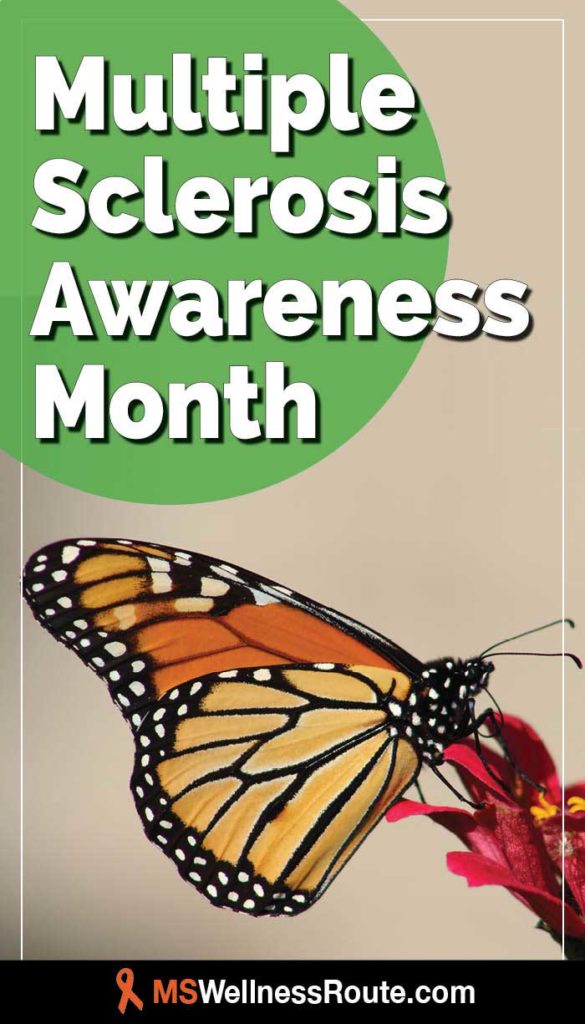Last Updated on January 30, 2025 by Cathy

March is National Multiple Sclerosis Awareness Month. It is to bring attention to this awful disease and raise money. There are nearly one million people in the U.S. living with MS. Fortunately, there’s been a lot of news lately about MS, even before March. – Which a good thing since most people don’t truly know what MS is.
When I was first told I might have multiple sclerosis, also known as MS, I didn’t fully understand what it was. I knew it was an autoimmune disease and people ended up in a wheelchair but that was about it. My neurologist didn’t even explain it, he told me to go buy a book and to “hope for the best and plan for the worst.”
I left that doctor’s office with no follow-up visit and feeling scared of the unknown. When I got home I had to look up the definition in a dictionary, this was before the internet.
This is the actual quote I read from Webster’s New World Dictionary:
“A chronic disease in which there is scattered demyelination of the central nervous system: it is characterized by speech defects, loss of muscular coordination, etc.”
That was it, only one long sentence telling me what my future held. That was a long time ago and a lot has changed for MS patients. Sure there still is no cure but there are many research studies and different ways of managing MS.
Conventional Medicine
Pharmaceutical drugs for MS came out in the 1990s. These drugs are toxic and DON’T stop the progression. According to my neurologist, “if they work they only work 33 percent of the time.” – those are pretty bad odds!
“Conventional therapies for MS are based on the use of anti-inflammatory and immunomodulatory drugs, but these treatments are not able to stop the destruction of nerve tissue.” – PubMed
Then you will need more drugs to counteract the horrible side effects. I went down that path and started on one of the interferons. But… my flares were getting stronger and closer together.
Functional Medicine

Functional medicine believes in healing the body as a whole and not just the symptoms. The doctors spend time with their patients getting a history of the lifestyle factors that led them to MS. They look for the “why” – the underlying cause of the disease.
Functional medical practitioners look for:
- Food sensitivities
- Heavy metals
- Infections
- Poor diet
- Toxins
- Stress
Different types of lab, blood, or genetic testing may be required. These tests will often reveal problems you never realized were there. Such as an MTHFR genetic mutation, mercury toxin, or a low cortisol level. It will depend on YOUR specific situation on which tests you need.
FUNCTIONAL MEDICINE is the future of conventional medicine–available now. It seeks to identify and address the root causes of disease and views the body as one integrated system, not a collection of independent organs divided up by medical specialties. It treats the whole system, not just the symptoms.”
– Mark Hyman, MD
Functional medicine believes in the 4 R’s for healing:
- Remove the factors that may be contributing to your symptoms. Such as food sensitivities, pathogens, poor diet, stress, etc.
- Replace with healthy foods and good digestion which may be lacking in your gut.
- Reinoculate your gut with good bacteria. Such as fermented foods and probiotic supplements to improve your microflora balance.
- Repair the lining of your gut with nutrient-dense foods and supplements. It will reduce inflammation and improve cell growth in your gut.
The Wahls Protocol
Researchers are beginning to believe that a nutrient-dense diet can reverse diseases. An anti-inflammatory diet includes vitamins, minerals, antioxidants, and omega-3 fatty acids. Dr. Terry Wahls was able to reverse her MS by following a nutrient-dense paleo diet.
Dr. Wahls was in a tilt-recline wheelchair when she started with the Paleo diet. She finally came up with a diet that feeds the mitochondria. Mitochondria are the powerhouse in your cells that run the energy supply to cells.
Within three months she noticed improvements. Within nine months she was able to go on an 18-mile bike ride. Removing inflammation and toxins allows your body to heal itself.
Changes you can make starting today!
Lowering inflammation is crucial to your healing. It’s important to eat an anti-inflammatory diet with lots of vegetables. Include a wide variety of dark leafy greens, and colorful, and sulfur vegetables each day.
Foods to remove:
- Dairy
- Gluten/grains
- Legumes
- Processed foods
- Refined sugar and carbohydrates
- Unhealthy fats and oils
This includes breakfast cereals, canola oil, fruit juices, soda, pastries, and boxed meals. Processed foods increase inflammation and cause your blood sugar to spike and fall. Especially refined carbohydrates (sugar and flour) and high fructose corn syrup.
Foods to include:
- Vegetables
- Fruit
- Herbs and spices
- Wild-caught fish
- Grass-fed and finished beef
- Pasture-raised poultry
- Nuts and seeds
- Healthy fats and oils (coconut oil, olive oil, etc.)
Buy organic as much as possible to avoid pesticides, growth hormones, and antibiotics. If your wallet is tight buy only organic produce if they are on the Dirty Dozen list. This is a list from the Environmental Working Group with the most pesticides.
Fasting and ketones help support your brain’s mitochondria. I personally fast for about 14 hours each day, starting in the evening and ending in the morning. You can buy ketone strips at your local drugstore, you don’t need a prescription.
I carb count since my son is a type 1 diabetic and we’re already paying attention to how many carbs are in each meal. You can also buy a glucose (blood sugar) meter with test strips to keep track of your blood sugar. But that means pricking your finger to draw blood each time.
Improve Your Gut Health

Researchers discovered people with MS have higher levels of bad bacteria. Include foods with probiotics and prebiotics to reduce inflammation. (Prebiotics feed probiotics.) Foods such as sauerkraut, coconut yogurt, and kimchi have probiotics. Foods such as asparagus, onions, and leaks have prebiotics.
Optimize Your Health
Besides diet, you need to look at everything in your life. Do you smoke? Are you stressed? You need to address all these factors. It’s all about balancing your life to get your symptoms reversed.
- Balance hormones including adrenal glands, thyroid, and sex hormones
- Check for mold in your home
- Check your vitamin D level, it should be between 60-80 ng/mL
- Eat foods high in antioxidants such as blueberries, strawberries, dark green veggies
- Exercise such as stretching, tai chi, walking, and yoga, my favorite is OptimalBody Personal Fitness
- Fast for 12-14 hours every day
- Follow a low-carb or ketogenic diet
- Get good quality sleep, at least eight hours each night
- Have regular bowel movements
- Improve your gut health with probiotics and prebiotics
- Kill infections, bacterial and fungal overgrowth, parasites
- Omega-3 fish oil helps rebuild the myelin sheath
- Reduce stress
- Test for heavy metal toxicity
- Use herbs to reduce inflammation such as cloves, ginger, green tea, rosemary, turmeric
- Vitamin C and vitamin E help strengthen the immune system
- Watch for food sensitives
Quick Links to information in this post:
The Connection Between MS and Candida
How to Start an Elimination Diet
What is the Wahls Protocol?
Quickly Improve Your Gut Health
5 Steps to Heal Your Multiple Sclerosis
Subscribe for free and I’ll send you the password to my secret library filled with many printables including the “5 Steps to Heal Your Multiple Sclerosis” for your wellness journey.
Want to remember this? Pin it to your favorite Pinterest board!






